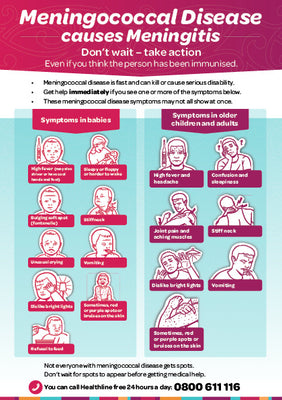Meningococcal Disease - Don't Wait, Take Action - HE2417

This pamphlet describes the symptoms associated with meningococcal disease in babies and older children and adults. It also outlines the actions to take if anyone in the household show symptoms of meningococcal disease.
The full resource:
Meningococcal Disease causes Meningitis
Don’t wait – take action
Even if you think the person has been immunised.
- Meningococcal disease is fast and can kill or cause serious disability.
- Get help immediately if you see one or more of the symptoms below.
- These meningococcal disease symptoms may not all show at once.
Symptoms in babies
- High fever (may also shiver or have cool hands and feet)
- Sleepy or floppy or harder to wake
- Bulging soft spot (fontanelle)
- Stiff neck
- Unusual crying
- Vomiting
- Dislike bright lights
- Sometimes, red or purple spots or bruises on the skin
- Refusal to feed
Symptoms in older children and adults
- High fever and headache
- Confusion and sleepiness
- Joint pain and aching muscles
- Stiff neck
- Dislike bright lights
- Vomiting
- Sometimes, red or purple spots or bruises on the skin
Not everyone with meningococcal disease gets spots. Don’t wait for spots to appear before getting medical help.
You can call Healthline free 24 hours a day: 0800 611 116
Don’t wait – take action
If you or someone in your household is sick with one or more of the symptoms shown over the page, take action immediately.
There are different types of meningococcal disease. People can still get meningococcal disease even if they have been immunised against one type of meningococcal disease.
- Act immediately even if you’re not sure it’s meningococcal disease.
- If it is an emergency, call 111 and ask for an ambulance.
- Ring a doctor, medical or after-hours-centre or the free Healthline number (0800 611 116) right away, day or night.
- Say what the symptoms are.
- If a person has been sent home by the doctor, they must still be watched. Don’t leave them alone.
- If the person gets worse, go straight back to a doctor or the hospital. Insist on immediate action. Take this card with you if it helps you explain what is wrong.
You can call Healthline free 24 hours a day: 0800 611 116 – even if you have already been seen by a doctor or nurse.
Code: HE2417.